|
|
|
Sort Order |
|
|
|
Items / Page
|
|
|
|
|
|
|
| Srl | Item |
| 1 |
ID:
078777
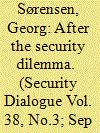

|
|
|
|
|
| Publication |
2007.
|
| Summary/Abstract |
The security dilemma - which raises the imminent risk of war between sovereign states - has always been considered the core issue of international relations. But, the security dilemma is in decline. Interstate war is no longer the supreme concern on the international security agenda. Instead, new dilemmas have emerged, in particular the insecurity dilemma and the associated value dilemma. The insecurity dilemma poses a looming risk of violent domestic conflict in weak states. The related value dilemma concerns the ambiguous content of core liberal values. Negative liberty is autonomy, self-determination and the ability to act unimpeded by others. The promotion of negative liberty calls for non-intervention. Positive liberty is removal of the obstacles that stand in liberty's way: oppression, poverty, ignorance and tyranny. The promotion of positive liberty calls for intervention. Emphasizing negative liberty creates grave problems; emphasizing positive liberty creates grave problems of a different kind. Compromises between intervention and non-intervention must always be troubled and uneasy, because they involve trade-offs between liberal values that are all desirable. There is no clear path to a more liberal world order
|
|
|
|
|
|
|
|
|
|
|
|
|
|
|
|
| 2 |
ID:
065751
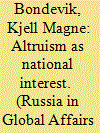

|
|
|
| 3 |
ID:
080324
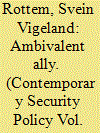

|
|
|
|
|
| Publication |
2007.
|
| Summary/Abstract |
NATO's future has long been in question, with the core of the debate revolving
around America and other great powers. This article finds comparable tensions
among smaller members. Examining the case of Norway, it argues that since the
end of the Cold War, Norway has lacked a clear mandate for its role in NATO,
and as such should be considered an ambivalent ally. This ambivalence is seen
when Norway reluctantly follows through on NATO policy. NATO's readiness to
act in the High North also is questioned.
This article examines Norway's NATO relations in four dimensions, collective
defence and collective security, position and values, influence and national priorities,
scepticism and reliability. Here realism and constructivism can provide us with an
analytical backdrop to explain Norwegian ambivalence. International power structures
create and constrain windows of opportunity for Norway, but national and international
norms and identity should not be left out of the analysis. Norway is entangled
in realist politics, but the legacy of neutrality and the perception of Norway as a
peaceful nation cannot be ignored. The result of this tension is Norway's unsettled
relationship with the new NATO.
|
|
|
|
|
|
|
|
|
|
|
|
|
|
|
|
| 4 |
ID:
155790
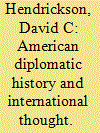

|
|
|
|
|
| Summary/Abstract |
This essay offers a constitutional perspective on the American encounter with the problem of international order. Its point of departure is the American Founding, a subject often invisible in both the history of international thought and contemporary International Relations theory. Although usually considered as an incident within the domestic politics of the United States, the Founding displays many key ideas that have subsequently played a vital role in both international political thought and IR theory. The purpose of this essay is to explore these ideas and to take account of their passage through time, up to and including the present day. Those ideas shine a light not only on how we organize our scholarly enterprises but also on the contemporary direction of US foreign policy and the larger question of world order.
|
|
|
|
|
|
|
|
|
|
|
|
|
|
|
|
| 5 |
ID:
094532
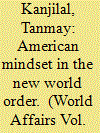

|
|
|
|
|
| Publication |
2010.
|
| Summary/Abstract |
A state can be defined as a moral person represented by its leadership whose culture and mindset it reflects. Given that the US has been a unipolar superpower in recent years and that it is rapidly declining in the face of several rising nations and regional blocs, it is important to understand its behaviour and predict its probable reactions in the future multipolar world. Contrary to the claims of its advocates, Tanmay Kanjilal notes that US preponderance has most often spread disorder and conflict internationally and is generating strong foreign and domestic reactions that set limits to the country's power.
|
|
|
|
|
|
|
|
|
|
|
|
|
|
|
|
| 6 |
ID:
052930
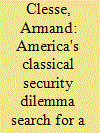

|
|
|
|
|
| Publication |
Apr-Jun 2004.
|
| Summary/Abstract |
The US is fast becoming a totalitarian, militaristic society, increasingly intolerant of different economic and political systems. Washington's policy of pursuing the elusive goal of absolute national security is in fact making both America and the world more and more unstable and dangerous
|
|
|
|
|
|
|
|
|
|
|
|
|
|
|
|
| 7 |
ID:
075658
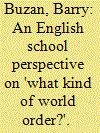

|
|
|
| 8 |
ID:
006570
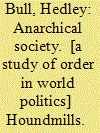

|
|
|
|
|
| Publication |
Houndmills, Macmillan, 1995.
|
| Description |
xviii, 329p.
|
| Standard Number |
0333638212
|
|
|
|
|
|
|
|
|
|
|
|
Copies: C:1/I:0,R:0,Q:0
Circulation
| Accession# | Call# | Current Location | Status | Policy | Location |
| 038319 | 327.1/BUL 038319 | Main | Withdrawn | General | |
|
|
|
|
| 9 |
ID:
170604
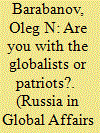

|
|
|
| 10 |
ID:
074584
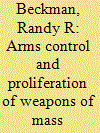

|
|
|
|
|
| Publication |
Washington, DC, US Army College, 1996.
|
| Description |
26p.
|
|
|
|
|
|
|
|
|
|
|
|
Copies: C:1/I:0,R:0,Q:0
Circulation
| Accession# | Call# | Current Location | Status | Policy | Location |
| 039387 | 327.174/BEC 039387 | Main | On Shelf | General | |
|
|
|
|
| 11 |
ID:
086431
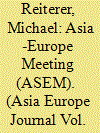

|
|
|
|
|
| Publication |
2009.
|
| Summary/Abstract |
Since its inception in 1996 ASEM has provided an opportunity for focussing relations between the EU and East Asia as a forum for informal multilayered dialogue and building a framework for enhanced cooperation in the political, economic and social/cultural fields. Inter-regionalism, of which ASEM is the incarnation in the EU-Asia relationship, developed into an important policy tool of the EU in an effort to maintain a multipolar setting. Regional identities in Asia are at a different level when comparing South East Asia, North East Asia, East Asia and South and Central Asia. ASEM contributed to a certain extent to the region building in East Asia. Although the economic pillar of ASEM turned out to be the more important one when compared to the political and the people-to-people pillars, it will not become the basis for a (deep) inter-regional free trade agreement because of the diversity of the Asian members, reinforced by the last ASEM enlargement. However, turning weakness into strength, ASEM could become the EU's vehicle for a more holistic approach to Asia thereby fostering a more economic and political multipolar world order. The financial melt down of the international financial order lead to the rediscovery of the need for international cooperation not only on the level of business but also among states. Making use of ASEM, developed over the last 12 years, could provide the much needed platform in the EU-Asia relationship.
|
|
|
|
|
|
|
|
|
|
|
|
|
|
|
|
| 12 |
ID:
173298
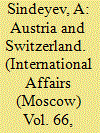

|
|
|
|
|
| Summary/Abstract |
THE WORLD ORDER is undergoing yet another transformation, and one whose result is hard to foresee.1 Europe is getting ready to get involved in rivalries among options for globalization, and this means it is again important for scholars to take up something that until recently was in danger of becoming a peripheral area of research - holistic studies of individual countries, including analysis of behavior models of smaller states and their desire and resources for relationships with larger actors.
|
|
|
|
|
|
|
|
|
|
|
|
|
|
|
|
| 13 |
ID:
131843


|
|
|
|
|
| Publication |
2014.
|
| Summary/Abstract |
As relations between Japan and China change due to a paradigm shift that has occurred over the past few years, the need for a new security outlook and world view has emerged. In East Asia, the foundation for the relationship between Japan and China must be fairness and justice, and the rule of law. This article proposes ways that Japan and China can work to cultivate common ground that would bring forth the possibility of a new Japan-China relationship based on the "strategic reciprocal relationship" established in 2006.
|
|
|
|
|
|
|
|
|
|
|
|
|
|
|
|
| 14 |
ID:
131995


|
|
|
|
|
| Publication |
2014.
|
| Summary/Abstract |
Within the scholarly debate on the current power transition in the international system, particular importance is attached to China's economic rise and the global shifts it is bringing forth in material primacy. A thorough understanding of these shifts in the relative distribution of power, however, requires leaving the narrow path of material capabilities and looking at normative accounts as well. Taking up this challenge, the article focuses on the political dimension of China's rise by exploring the country's alignment with South American governments along two dimensions: the convergence of their foreign policy ideas and the provision of diplomatic links facilitating their cooperation and coordination in global politics. The empirical analysis depicts a nascent global agenda forming between China and certain South American countries and shows that, along with growing levels of foreign policy compatibility, China has also advanced its diplomatic inroads into the region, particularly at the level of bilateral relations. Taking these developments as a whole, it is suggested that China has gained international attraction in terms of its visions of global order and as a potential political partner throughout the region. The article concludes with a discussion of the findings in light of the ongoing relative shifts in the distribution of global power beyond material primacy, and the prospects for China's further political rise.
|
|
|
|
|
|
|
|
|
|
|
|
|
|
|
|
| 15 |
ID:
164252
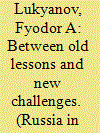

|
|
|
| 16 |
ID:
133547
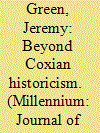

|
|
|
|
|
| Publication |
2014.
|
| Summary/Abstract |
This article scrutinises Robert Cox's theorisation of 19th century world order, proposing 'uneven and combined development' as an alternative conceptual approach. I contend that Cox's understanding of 19th century world order is insufficient as it neglects the significance of German ascendance. Privileging hegemonic construction of world order, Cox's account of the decomposition of Pax Britannica reifies the neo-realist anarchy problematique. Overall, Cox exaggerates the degree of rupture between phases of world order, obscuring developmental continuities that produce different 'geopolitical' contexts. Uneven and combined development, I propose, enables a fruitful reappraisal of the period. Process-based international historical sociology is suggested as an alternative way to think about 19th century world order and critical IR.
|
|
|
|
|
|
|
|
|
|
|
|
|
|
|
|
| 17 |
ID:
090145
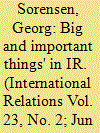

|
|
|
|
|
| Publication |
2009.
|
| Summary/Abstract |
Structural realism has important insights to offer regarding the current balance of power and its effects on world politics. But structural realism is less ready to analyze changes in statehood and their implications for international relations. States are not `like units' and anarchy does not always mean self-help. A richer concept of structure which includes economic power, political-military power, and international norms gives us a better take on the ways in which international forces affect domestic structures of states. In particular, they help us detect the weak states in the developing world, and the postmodern states in the OECD world. In weak states the classical security dilemma has been turned on its head: instead of domestic order and international threat there is domestic threat and international order. In postmodern states violent external threat has been dramatically reduced because these states make up a security community.
|
|
|
|
|
|
|
|
|
|
|
|
|
|
|
|
| 18 |
ID:
148340
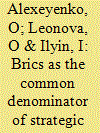

|
|
|
|
|
| Summary/Abstract |
GLOBALIZATION and regionalization have set a trend for new associations of states such as regional and interregional organizations and dialogue forums to emerge to take over decision-making on some international issues. New regional organizations and dialogue forums are set up with the participation of emergent political players, actors that are vehicles of an innovative format of international cooperation. BRICS, which brings together five key regional powers representing four continents and four major civilizations, is a splendid example of such an association.
|
|
|
|
|
|
|
|
|
|
|
|
|
|
|
|
| 19 |
ID:
180791
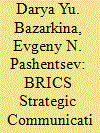

|
|
|
|
|
| Summary/Abstract |
The article examines the current state and development trends of BRICS
strategic communication. Proceeding from the understanding of strategic
communication as projection by a state or an interstate entity of long-term
values, interests, and goals into the minds of audiences by synchronizing
activities in all spheres of public life, the authors analyze the main content
of BRICS strategic communication and assess its prospects amid the
changing world order. The study, conducted from September 2020 to April
2021 on the basis of open sources, made it possible to define the conceptual
basis of BRICS strategic communication; specify the factors underlying
the formation of BRICS strategic communication engendered by the very
nature of cooperation between its member-states; and identify the main
problems and trends in the development of BRICS strategic communication.
The authors conclude that one of the main messages BRICS is sending to
the world through its strategic communication is economic alternativeness,
which allows developing nations and countries under pressure from Western
political, financial, and economic institutions to remain engaged in global
economic processes.
|
|
|
|
|
|
|
|
|
|
|
|
|
|
|
|
| 20 |
ID:
082778
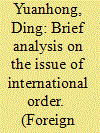

|
|
|
|
|
|
|
|